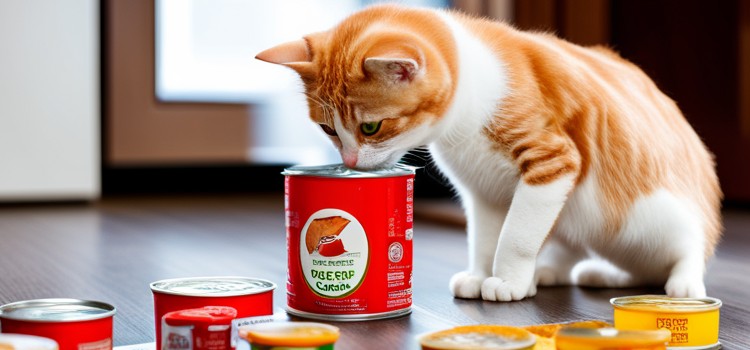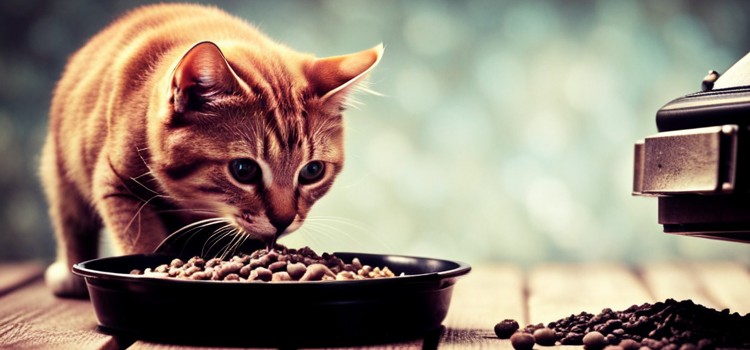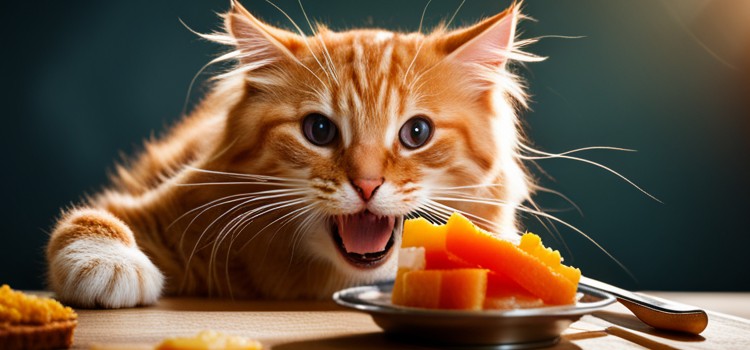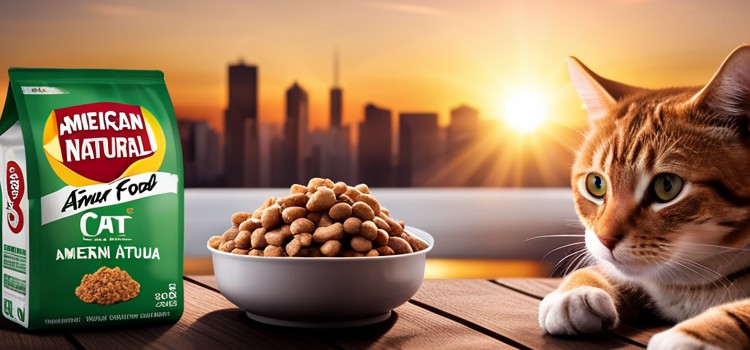As an Amazon Associate committed to the mission of improving the lives of our readers, Live-Clear.com receives a small commission from eligible purchases made through our affiliate links. This revenue enables us to keep producing insightful articles and other material.
Cats should not be given miso soup as it can be harmful to their health. Miso soup contains ingredients that are not suitable for feline consumption.
Cats are obligate carnivores, meaning their diet should consist mainly of animal proteins. Miso soup contains ingredients that can be harmful to cats, such as onions, garlic, and soy products. These ingredients can cause digestive issues and, in some cases, lead to more serious health problems for cats.
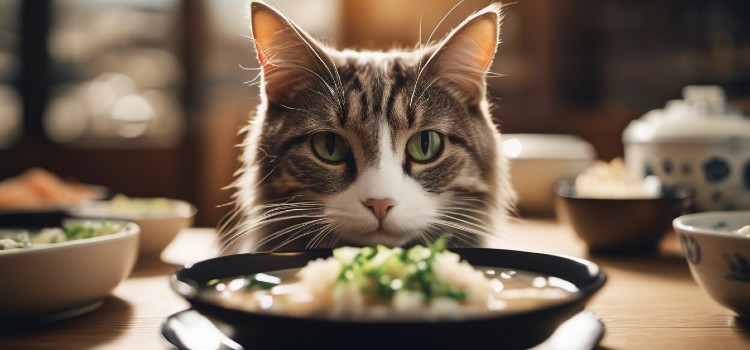
It’s important to be mindful of the foods we offer our pets and ensure they are safe and suitable for their digestive systems. While miso soup may be a comforting and tasty dish for humans, it’s best to keep it away from our feline friends to avoid any potential health risks.
Understanding Miso Soup
Miso soup is a traditional Japanese dish that has gained popularity around the world. It’s known for its rich umami flavor and is often categorized as a staple in the Japanese diet. Understanding miso soup, including its ingredients and nutritional value, is essential, especially for pet owners contemplating whether it’s safe for their feline friends to consume.
What Is Miso Soup?
Miso soup is a traditional Japanese soup consisting of dashi broth and miso paste as the key ingredients. Dashi broth is typically made from kombu (dried kelp) and bonito flakes, while miso paste is created from fermented soybeans and sometimes grains like rice or barley. The combination yields a savory, earthy, and slightly salty flavor that forms the base of miso soup.
Ingredients In Miso Soup
Miso soup’s ingredients can vary significantly based on regional preferences and personal taste. However, the core components of miso soup usually include:
- Fermented soybean paste (miso).
- Dashi stock (seaweed and fish-based).
- Tofu.
- Green onions.
- Seaweed.
These ingredients collectively contribute to the unique taste and nutritional composition of miso soup, making it a staple in Japanese cuisine.
Nutritional Value Of Miso Soup
Miso soup is not only revered for its delicious taste, but also for its nutritional value. It contains a wealth of essential nutrients, including vitamins, minerals, and beneficial enzymes. Miso paste itself is a great source of protein, fiber, vitamins B and K, and various minerals such as manganese and zinc. Additionally, the inclusion of tofu, seaweed, and vegetables adds further nutritional benefits to miso soup, making it a well-rounded and wholesome option.
Can Cats Eat Miso Soup?
When it comes to the topic of whether cats can eat miso soup, it’s essential for pet owners to be informed about the dietary restrictions, risks, and potential health issues associated with feeding miso soup to their feline companions. Though miso soup contains various ingredients such as fermented soybeans and dashi that are beneficial for humans, it’s crucial to understand how these components may affect a cat’s health. This article will delve into the specifics of whether it’s safe for cats to consume miso soup, and the potential implications it can have on their well-being.
Dietary Restrictions For Cats
Cats have specific dietary requirements that differ from those of humans. They are obligate carnivores, meaning their diet should primarily consist of animal-based proteins. Their nutritional needs are centered around high-quality animal proteins, essential amino acids, and specific vitamins and minerals, all of which may not be adequately provided by miso soup. It’s vital to prioritize a balanced and appropriate diet, focusing on cat-friendly foods that fulfill their nutritional necessities. While including certain vegetables or supplements in a cat’s diet can be acceptable, it’s crucial to consult a veterinarian before introducing any new elements to their meals.
Risks And Benefits Of Miso Soup For Cats
- Risks: Miso soup contains ingredients such as soy and potentially high levels of sodium, which may be detrimental to a cat’s health. Soy products can be difficult for cats to digest and may contribute to gastrointestinal issues. Furthermore, the elevated sodium content in miso soup could pose a risk of dehydration and hypertension in felines.
- Benefits: On the other hand, the fermented nature of miso can introduce beneficial probiotics to your cat’s diet, promoting a healthy gut microbiome. Miso soup also offers a source of protein and essential amino acids, which can be advantageous for your cat’s overall well-being when incorporated in moderation.
Potential Health Issues For Cats
Feeding miso soup to cats can result in various health issues, including digestive disturbances, kidney problems, or potential toxicity from harmful ingredients. Cats may experience symptoms such as vomiting, diarrhea, lethargy, or disinterest in food after consuming miso soup. These signs can indicate an adverse reaction to the ingredients found in miso soup, necessitating prompt veterinary attention. To safeguard the well-being of cats, it’s crucial to keep miso soup and similar dishes out of their reach and to prioritize appropriate feline nutrition.

Impact Of Miso Soup On Cats
When it comes to feeding our beloved feline friends, it’s essential to be mindful of the foods we offer them. Miso soup, a traditional Japanese dish, may be a delicacy for us, but can cats have miso soup? Let’s delve into the impact of miso soup on cats and explore the potential effects it may have on our feline companions.
Digestive System Tolerance
Cats have highly sensitive stomachs and may not be able to digest certain ingredients commonly found in miso soup, such as soy, which can lead to digestive disturbances. Consuming miso soup can potentially upset their stomach and cause gastrointestinal discomfort. It’s crucial to be cautious and considerate of the impact miso soup may have on a cat’s delicate digestive system.
Allergic Reactions In Cats
Some cats may be allergic to soy and other components of miso soup. Allergic reactions in cats can manifest in various ways, such as skin itching, gastrointestinal upset, or respiratory issues. It’s important to monitor for any signs of allergic reactions if miso soup is inadvertently consumed by a cat, as prompt veterinary attention may be necessary to alleviate the symptoms.
Nutritional Significance For Cats
While miso soup is a source of nutrients for humans, it may not provide significant nutritional value for cats. The ingredients in miso soup, including soy, may not align with the dietary requirements of felines. Cats have specific nutritional needs that are best met through a balanced diet formulated for their unique physiology. It’s essential to prioritize their nutritional needs by offering them food that is tailored to promote their overall health and well-being.
Introducing Miso Soup To Cats
Adding variety to a cat’s diet can be beneficial, but it’s crucial to introduce new foods cautiously, especially when it comes to human foods like miso soup. While miso soup can be a nutritious option for humans, it’s essential to consider whether it is safe for feline consumption. Before incorporating miso soup into your cat’s diet, it’s important to understand the potential risks and safe methods for introducing this popular Japanese dish to your pet.
Safe Methods For Introducing Miso Soup
- Gradual Introduction: When introducing miso soup to your cat, start by offering very small amounts, mixed with their regular food. This gradual introduction allows your cat to acclimate to the new flavor and assess their reaction.
- Quality Ingredients: Use high-quality, organic miso paste with no added artificial flavors or preservatives. Look for a low-sodium option, as excessive salt intake can be harmful to cats.
- Monitor Consumption: After the initial introduction, observe your cat for any signs of digestive upset or allergic reactions. If there are no adverse reactions, miso soup can be offered occasionally as a small treat.
Signs Of Allergic Reactions Or Intolerance In Cats
- Gastrointestinal Distress: Watch for symptoms such as vomiting, diarrhea, or decreased appetite after consuming miso soup. These may indicate a negative reaction to the food.
- Skin Irritation: Keep an eye out for unusual scratching, redness, or swelling on the skin. These signs could point to an allergic response to the miso or other ingredients.
- Behavioral Changes: Pay attention to any changes in your cat’s behavior, such as lethargy or irritability, which could indicate an intolerance to the new food.
Alternatives To Miso Soup For Cats
While miso soup is a delicious and nutritious option for humans, it’s important to consider the dietary needs of our feline friends. Cats have specific dietary requirements that differ from ours, and it’s crucial to provide them with safe and beneficial food options.
Feline Dietary Requirements
Cats are obligate carnivores, meaning their diet should primarily consist of animal-based proteins. They require essential nutrients such as taurine, arginine, and high-quality protein sources to maintain optimal health.
Safe And Beneficial Food Options
When choosing alternative foods for your cat, opt for high-quality, protein-rich options that align with their dietary needs. Consulting with a veterinarian can provide valuable guidance in selecting safe and beneficial choices. Some suitable options include:
- Fresh, lean meats: such as chicken, turkey, or beef.
- Cooked fish: ensure there are no bones, and it’s not seasoned or flavored.
- Feline-specific commercial cat foods: formulated to meet their nutritional needs.
- Fruit and vegetables: in moderation, as a supplement to their protein-rich diet.
Recipes For Cat-friendly Meals
Preparing homemade meals for your cat can be a rewarding way to ensure they receive a well-balanced diet. When creating cat-friendly recipes, consider incorporating the following ingredients:
- Protein sources: prioritize animal-based proteins such as chicken or fish.
- Taurine-rich ingredients: essential for feline heart and eye health.
- Minimal seasoning: avoid adding salt, garlic, and onion, as these can be harmful to cats.

Signs Of Miso Soup Allergies In Cats
When it comes to feeding human food to your cat, it’s essential to be aware of potential allergic reactions. Miso soup, a traditional Japanese dish, is a popular choice for many individuals. However, can cats have miso soup without experiencing adverse reactions? Understanding the signs of miso soup allergies in cats is crucial to ensure the well-being of your feline companion.
Common Symptoms
If your cat has an allergy to miso soup, you may notice a range of common symptoms that indicate an adverse reaction. These can include:
- Itching and scratching: Excessive itching or scratching, particularly around the face and ears.
- Digestive issues: Vomiting, diarrhea, or constipation may occur as a result of a miso soup allergy.
- Skin irritation: Redness, hives, or other skin reactions may develop after ingesting miso soup.
Pet Healthcare For Allergic Reactions
If you suspect that your cat is experiencing an allergic reaction to miso soup, it is crucial to seek veterinary care. Your veterinarian can provide guidance on treating the allergy symptoms and may recommend potential dietary changes to avoid future reactions. In severe cases, they may prescribe medication to alleviate discomfort and manage the allergic response.
Risks Of Untreated Allergies
Untreated miso soup allergies in cats can pose significant risks to their health. Continued exposure to allergens can lead to chronic inflammation, skin infections, and discomfort for your pet. Additionally, untreated allergies may weaken the immune system, leaving your cat vulnerable to other potential health issues.
Consulting A Veterinarian
Consulting a Veterinarian is crucial when considering the diet of your feline friend. Whether it’s about introducing new foods or addressing health concerns, seeking professional advice can provide clarity and guidance in ensuring your cat’s well-being.
Importance Of Professional Advice
Seeking professional advice is essential when it comes to making dietary choices for your cat. Veterinarians possess the knowledge and expertise to offer personalized recommendations based on your cat’s specific needs, ensuring that any dietary decisions are well-informed and beneficial for their health.
Health Implications Of Miso Soup Consumption
Miso soup, a traditional Japanese dish, contains high levels of sodium and may also contain ingredients that can be harmful to cats. Excessive sodium intake can lead to dehydration and kidney issues in cats. Furthermore, certain ingredients in miso soup, such as onions and garlic, are toxic to cats and can cause severe health complications. Additionally, the probiotics found in miso may not be well-tolerated by all cats, especially those with sensitive stomachs.
Finding The Right Veterinary Guidance
Finding the right veterinary guidance involves seeking a veterinarian who has experience and knowledge in feline nutrition. Look for a professional who can offer tailored advice for your cat’s dietary needs. Ensure that the veterinarian takes into account any existing health conditions or sensitivities your cat may have when providing dietary recommendations.
Safety Measures For Cat Diets
When it comes to the safety of our feline friends, it’s essential to pay close attention to the ingredients in their diet. Cats have specific dietary needs, and as responsible pet owners, it’s crucial to ensure that their food choices align with their health requirements. This article focuses on safety measures for cat diets, specifically exploring the considerations for incorporating miso soup into a cat’s diet.
Seasoning And Flavoring Considerations
When adding miso soup to your cat’s diet, it’s important to be mindful of the seasoning and flavoring used. While miso itself is generally safe for cats in small quantities, it’s vital to avoid using ingredients like onion, garlic, chives, or leeks, as these are toxic to cats. Additionally, the use of excessive salt or other strong flavors can be overwhelming for your cat’s delicate palate and may lead to digestive issues. Opt for plain, unsalted miso soup and consider offering a small amount to observe your cat’s response before making it a regular part of their diet.
Monitoring Cat’s Food Intake
Closely monitoring your cat’s food intake is crucial when introducing new foods like miso soup. Keep an eye on their overall consumption and be mindful of any changes in their behavior, appetite, or litter box habits. If your cat shows any signs of discomfort or digestive upset after consuming miso soup, it’s best to discontinue offering it to them and consult with a veterinarian. Incorporating miso soup should be a gradual process, allowing your cat’s digestive system to adjust to the new addition.
Creating A Balanced And Healthy Diet For Cats
In addition to occasional treats like miso soup, it’s important to maintain a balanced and healthy diet for your cat. This includes providing high-quality commercial cat food that meets their nutritional needs. Consult with a veterinarian to understand the essential nutrients required for your cat’s well-being and consider incorporating a variety of protein sources, vegetables, and supplements to ensure a well-rounded diet. Regular access to fresh water is also crucial for maintaining your cat’s overall health and hydration levels.
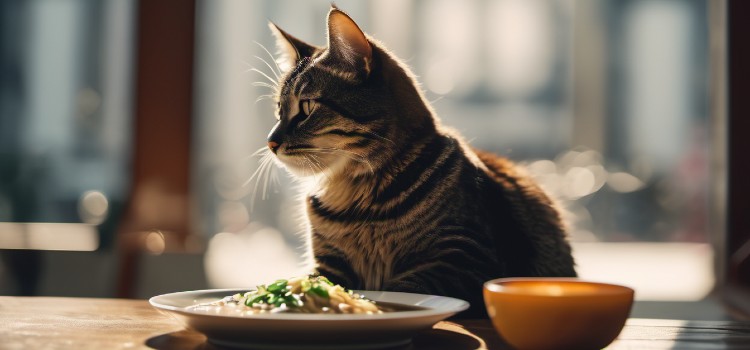
Conclusion
It’s best to avoid giving miso soup to cats due to potential health risks. While some may be curious about offering this Japanese delicacy to their feline friends, it’s essential to prioritize their well-being. Opt for cat-friendly treats and consult with a veterinarian for dietary advice. Cats have specific nutritional needs that are different from humans, and miso soup may not provide the necessary nutrients for their overall health. Additionally, miso soup often contains ingredients like onions and garlic, which can be toxic to cats. Therefore, it’s crucial to be cautious and stick to cat-approved food options to ensure their safety and well-being.
Frequently Asked Questions For Can Cats Have Miso Soup
Cats can eat broth-based soups with no added garlic, onion, or other harmful ingredients. Avoid creamy, spicy, or high-sodium soups and make sure the soup is at room temperature. Always consult your vet before offering any new food to your cat.
No, cats should not consume soy sauce as it is high in sodium and can be detrimental to their health.
Yes, cats can eat tofu in small amounts as an occasional treat. Tofu provides protein and is safe, but not a necessary part of their diet. Always consult a vet for specific dietary recommendations for your cat’s health.
Yes, cats can have vegetable soup as long as it is free from onions, garlic, and spices. It’s essential to avoid added salt and seasoning. Moderation is key to prevent digestive issues. Always consult with a vet before introducing new foods to your cat’s diet.
Yes, cats can safely consume miso soup in moderation as it provides beneficial probiotics.
Miso soup is not recommended for cats due to potential health risks. Cats have unique nutritional needs and miso soup may not provide them with the necessary nutrients. Additionally, ingredients like onions and garlic can be toxic to cats. It’s crucial to choose cat-friendly treats and consult a veterinarian for dietary advice. Cats should stick to cat-approved food options for their safety and well-being.
Amazon and the Amazon logo are trademarks of Amazon.com, Inc, or its affiliates.
